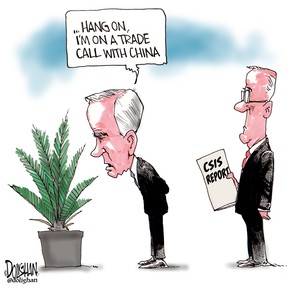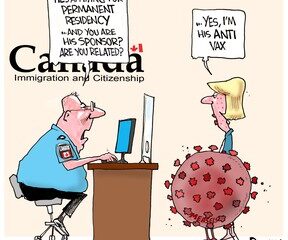Politics
Tim Dolighan’s Cartoon Sparks Debate on Political Satire

Tim Dolighan’s latest cartoon, published on November 15, 2025, has ignited a significant debate regarding the role of political satire in contemporary discourse. The cartoon, which addresses pressing political issues, highlights the fine line between humor and offense in an increasingly polarized society.
Tim Dolighan, known for his sharp wit and incisive commentary, has long been a prominent figure in the realm of political cartoons. This particular piece features caricatures of key political figures engaged in a satirical portrayal of current events. The cartoon’s release has prompted an outpouring of reactions across social media platforms, with many praising Dolighan for his boldness while others criticize the insensitivity of the content.
Public Reaction and Impact
The response to Dolighan’s cartoon has been varied. Supporters argue that satire serves as an essential tool for social commentary, providing a unique perspective on the absurdities of politics. One fan noted, “Dolighan captures the essence of what many are feeling. It’s refreshing to see someone unafraid to tackle these issues with humor.”
Conversely, critics have expressed concerns that such satire can perpetuate division and alienate certain groups. Some argue that the boundaries of humor have shifted, and what was once acceptable may now be seen as offensive. This sentiment was echoed by a spokesperson from a leading advocacy group, who stated, “While satire is important, it must be wielded carefully. The potential for misunderstanding is high.”
Exploring the Role of Satire in Society
The ongoing discussion surrounding Dolighan’s cartoon raises broader questions about the role of political satire in society. As public sentiment grows more complex, the challenge lies in balancing humor with sensitivity. Political satirists often walk a tightrope, striving to provoke thought while avoiding unnecessary backlash.
In recent years, the landscape of political commentary has evolved dramatically. Social media has amplified voices, allowing for rapid dissemination of opinions and reactions. This immediacy can lead to swift judgments, as seen in the case of Dolighan’s cartoon.
The debate surrounding his work is part of a larger conversation about how humor can influence public opinion and the importance of context in political discourse. As individuals engage with these topics, it becomes increasingly vital to consider the implications of satire in shaping societal narratives.
In conclusion, Tim Dolighan’s cartoon serves as a catalyst for important discussions about political satire today. As audiences navigate the complexities of humor and its impact, the conversation will likely continue to evolve, reflecting the dynamic nature of public discourse in an interconnected world.
-

 Politics1 week ago
Politics1 week agoSecwepemc First Nation Seeks Aboriginal Title Over Kamloops Area
-

 World4 months ago
World4 months agoScientists Unearth Ancient Antarctic Ice to Unlock Climate Secrets
-

 Entertainment4 months ago
Entertainment4 months agoTrump and McCormick to Announce $70 Billion Energy Investments
-

 Lifestyle4 months ago
Lifestyle4 months agoTransLink Launches Food Truck Program to Boost Revenue in Vancouver
-

 Science4 months ago
Science4 months agoFour Astronauts Return to Earth After International Space Station Mission
-

 Technology3 months ago
Technology3 months agoApple Notes Enhances Functionality with Markdown Support in macOS 26
-

 Top Stories1 month ago
Top Stories1 month agoUrgent Update: Fatal Crash on Highway 99 Claims Life of Pitt Meadows Man
-

 Sports4 months ago
Sports4 months agoSearch Underway for Missing Hunter Amid Hokkaido Bear Emergency
-

 Politics3 months ago
Politics3 months agoUkrainian Tennis Star Elina Svitolina Faces Death Threats Online
-

 Politics4 months ago
Politics4 months agoCarney Engages First Nations Leaders at Development Law Summit
-

 Technology4 months ago
Technology4 months agoFrosthaven Launches Early Access on July 31, 2025
-

 Top Stories3 weeks ago
Top Stories3 weeks agoFamily Remembers Beverley Rowbotham 25 Years After Murder





















